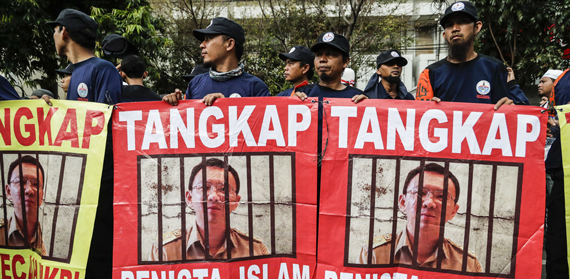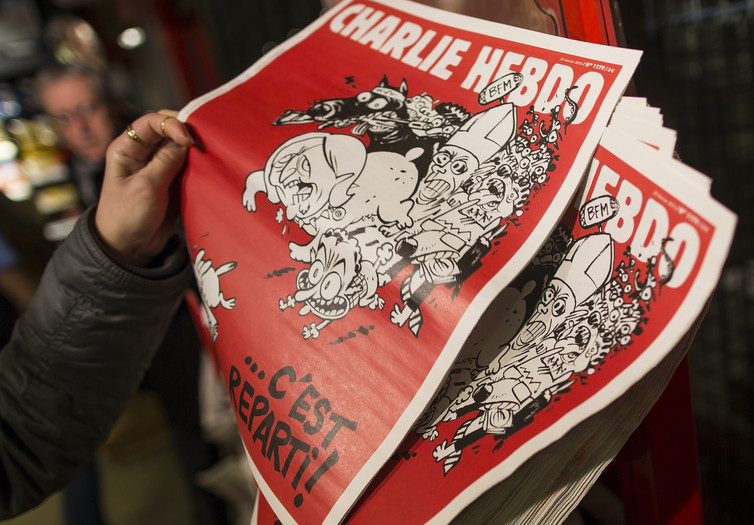Demonstrators demanding that Jakarta’s Christian governor, Basuki Tjahaja Purnama, should be jailed for blasphemy. EPA/Mast Irham
Guest post by Tony Meacham
According to reports in the BBC recently, Stephen Fry has been investigated in Ireland on charges of blasphemy. While the investigation stalled almost as quickly as it began, it was by no means the only occasion or high-profile matter of this type in recent weeks.
Discussing blasphemy feels anachronistic – something out of the middle ages. But it has recently been an issue as far away as Indonesia and as close as Ireland. W H Auden once observed that “one can only blaspheme if one believes”, but accusations of blasphemy have mainly been levelled against people who don’t share the same faith as the accusers.
Blasphemy charges are often used to express genuine religious outrage – but unproven allegations are also used for political or personal ends to persecute minorities or settle vendettas.
In the UK, Thomas Aikenhead was hanged for it in 1697, while John William Gott was the last to be imprisoned for the offence in 1922 – for publishing tracts on birth control and likening Jesus to a clown.
Such activity clashes with traditional notions of freedom of religion and freedom of speech. As John Roberts, the chief justice of the US Supreme Court argued in Snyder v Phelps (2011) in 2011:
Speech is powerful. It can stir people to action, move them to tears of both joy and sorrow, and … inflict great pain. … we cannot react to that pain by punishing the speaker. As a nation we have chosen a different course – to protect even hurtful speech on public issues to ensure that we do not stifle public debate.
But even in some countries that pride themselves on their ability to openly discuss matters publicly, the topic is coming up more frequently.
Religious politics
The subject is not uncommon in many countries that are avowedly religious and where the state would be expected to take such claims seriously. In Pakistan, for example, accusations of blasphemy have resulted in deaths from mob violence. Pakistan’s prime minister, Nawaz Sharif, intervened in April 2017 after the killing of Mashal Khan, a university student accused of posting blasphemous messages on social media.
“The nation should stand united to condemn this crime and to promote tolerance and rule of law in society,” he said.
Notwithstanding Sharif’s warning, a mob stormed a police station a couple of weeks later in an attempt to lynch a Hindu man charged with blasphemy. A 10-year-old boy was killed in the violence and several adults were injured. The mob was reportedly led by an influential cleric as well as Zia Shehzad, a politician from the ruling Pakistan Muslim League political party, giving the incident both religious and political overtones.
In March, the governor of Indonesia’s capital Jakarta, Basuki Tjahaja Purnama – a Christian in this majority Muslim nation – was successfully convicted of blasphemy in a trial which raised a counter accusation of “trial by mob” by the Setara Institute, a Jakarta-based rights group. “Ahok”, as he is known, will spend the next two years in jail.
These recent occurrences raise concerns regarding religious tolerance and pluralism in modern society. Representations have been made by the Organisation of the Islamic Conference (OIC) to the United Nations General Assembly and the Human Rights Council between 1999 and 2010, proposing resolutions relating to “defamation of religion”. These have been condemned by opponents who believe they aim to create a sort of international blasphemy law that may lead to domestic laws being passed.
Krithika Varagur, an American journalist living and working in Indonesia, has identified a spike in blasphemy charges over the past decade, especially in Indonesia where there is a near nil chance of acquittal. This is not isolated to Indonesia, she says – it’s becoming more common across the Muslim world. Some of this she suggests can be attributed to local circumstances – such as unrest in Egypt since the removal of the former president, Hosni Mubarak.
In the West
Accusations of this sort are less common in Western countries, which was what made the accusation against Fry remarkable. In May, Irish police investigated a complaint that he had blasphemed while being interviewed on RTE, the state broadcaster, about what he might say if he met God.
Ireland is one of the few Western countries to retain laws of this kind, in this case the Defamation Act 2009. This no trifling issue in Ireland, the offence attracts a fine of €25,000.
In February, meanwhile, a man in Denmark was charged with blasphemy for burning a copy of the Koran, a charge not made there for 46 years. Iceland only recently removed the offence from its books in 2015. Nor can we forget, of course, the murder of 12 of the staff of French satirical magazine Charlie Hebdo by Islamist militants who took offence at the magazine’s lampooning of Islam.
Nous sommes Charlie Hebdo. EPA/Ian Langsdon
Free speech on trial
US academic M. Christian Green has asked if there is an “inherent and inevitable conflict” between the right to express one’s religion and the right to criticise it. Paul Sturges, meanwhile, has argued that freedom of expression is too valuable to be limited by religious sensitivities.
Freedom of speech and freedom of religion are hard-fought human rights that appear to be slowly eroding. In 2012, then US president Barack Obama told the UN General Assembly that:
Given the power of faith in our lives and the passion that religious differences can inflame, the strongest weapon against hateful speech is not repression; it is more speech – the voices of tolerance that rally against bigotry and blasphemy, and lift up the values of understanding and mutual respect.
Let us hope that a common understanding prevails.
Originally written for ‘the Conversation’.





Comments are disabled